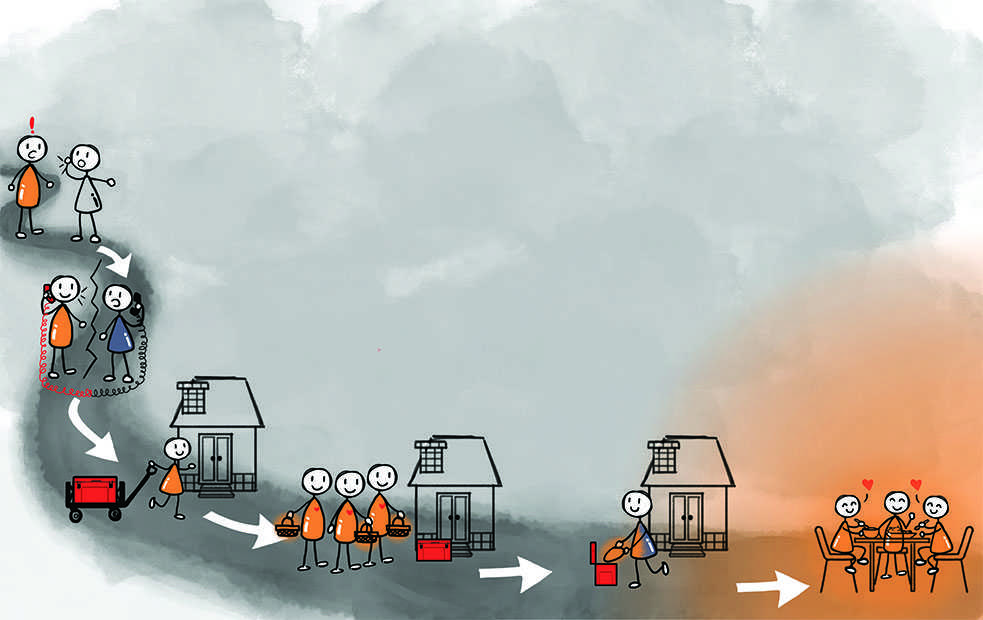Lori Merritt does not have a cape, but she does have a kitchen, a cooler and a community. For Merritt, the warm meal is a foundation of any home — a staple that many families going through challenges cannot afford. Through her cooking with the Meals on Wheels program, Merritt delivers both homely warmth and the support of a community.
The Palo Alto High School Meals on Wheels program, coincidentally also the name of a national meal service program for senior citizens, helps support Paly families in need with hot meals or groceries delivered to their door.
“This [meal support] is something that seems so small,” Merritt says. “We live in such a fast-paced community where people do big things. Talk to anybody and maybe they invented something or hold influential positions in global companies. This is something so basic and it makes a big difference in people’s lives immediately.”
Potentially eligible families are often referred to the program by close friends. Following an email confirmation, Merritt will speak directly over the phone to fully understand the family’s unique situation — dietary preferences, duration of time of need — which is passed on to the volunteers working with the family. To ensure food stays warm in cases where it cannot be received at the door, meals are dropped off to a blue cooler cart parked outside the family’s home. Meals delivered sometimes even come with flowers and get-well cards.
“It makes the giver feel good and I hope it makes the receiver know that people care about them,” says volunteer Colleen Gormley. “That makes the world feel a little gentler, a little smaller, a little kinder.”
“That [making meals] makes the world a little gentler, a little smaller, a little kinder.”
— Colleen Gormley, volunteer
Simply a caring community
Feeling a connection is crucial for both sides. Merritt says that volunteers are much more passionate about the work they are doing if they know their actions make a meaningful difference to the family. This personal connection is what makes the program closer to community support than a professional service.
“‘Client’ implies a business relationship,” says Karen, an anonymous beneficiary of the program. “You’re going through a very hard time and you’re feeling overwhelmed and even alone. Just when you feel the most visible and the most alone, there’s a helping hand and a surprising kindness.”
The program supports families with an individual fighting an illness as well. For these individuals, knowing that their family is being taken care of when they are unable to fulfill their normal duties matters more than anything else. Merritt says that helping with the entire process of preparing a meal — from the time to the finances — is what makes the program so impactful. For these families, setting aside time, energy and sometimes even money for a healthy homemade meal is just not possible during a medical emergency.
“It’s a support system that my daughter didn’t realize we had until Meals on Wheels,” Karen says. “So many meals just came from so many different people and it made a difference to her to know that people cared.”
The impact of the program continues even after the family comes off the program’s list and the blue cart is rolled off the porch.
Many beneficiaries come back to help because they know how much the program means. Paly English teacher Kindell Launer saw the impact that the program had in the situation of a relative and decided to volunteer herself.
“When he [the relative] was using Meals On Wheels, I just saw more liveliness,” Launer says. “It could have been the calories, but I think it was also from the social interaction, too. Preparing a special meal for a family and dropping it off and knowing that you were able to at least do one thing in what feels like a very powerless situation … giving back is actually actively empowering the person who is giving back.”
Gormley says she hopes that the program can not only make a difference to the family it helps, but also slowly change Bay Area culture for the better. According to Gormley, helping when others are at their most human is one of the most important parts of being human.
“Volunteerism and giving up yourself, is an important part of being a member of a community,” Gormley says. “And it fills a culture of generosity, which is something that I think is really special about Palo Alto.”
Merritt remembers the emails from a cancer patient reminding her that “what you do matters. This just helps so much.”
“The response I usually get from people is, ‘Oh my gosh, this has just been a godsend,” Merritt says. “If there’s anything I want people to know, it’s that if anyone is interested in signing up as as volunteer, we would love to have you. If anyone needs the service, please reach out to us.”
If you or anyone you know in the Palo Alto High School community might benefit from meal support, please reach out to Meals on Wheels at [email protected]



